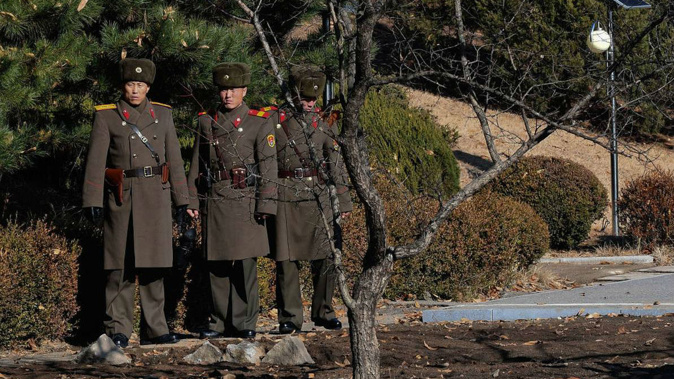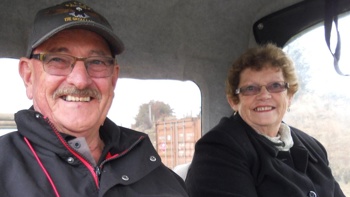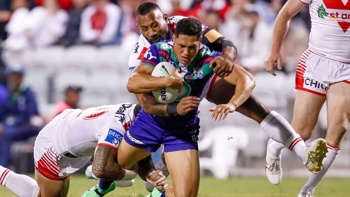
When the injured soldier was loaded onto into the Black Hawk helicopter, Sgt. 1st Class Gopal Singh, on his last mission as a flight medic, said a prayer. He did not think the man, who had been shot five times, was going to survive.
"I could tell immediately that this guy was probably going to die in the next 15 minutes if we didn't start working on him and get the aircraft off the ground," said Singh, a medic in the Eighth Army's 2nd Combat Aviation Brigade, stationed at Camp Humphreys in South Korea.
The evacuation crew did not know it then, but their patient was a North Korean soldier who had just made a daring dash for freedom across the Joint Security Area, the neutral section in the demilitarised zone where enemy troops stand face-to-face.
The soldier, a 24-year-old named Oh Chong Song, was shot five times by North Korean border guards November 13 as he ran across the line, but he managed to get himself to shelter against a building on the southern side.
He lay there, in a pile of leaves, for as long as 30 minutes until South Korean soldiers were able to crawl to him and drag him to safety.
While they were doing that, Pfc. Karina Lopez, the radio operator in a UH-60 medical evacuation Black Hawk crew that was on duty at Camp Casey, a US base on the southern side of the DMZ, received a call saying they might be needed for a medical evacuation.
For more than six decades, American and South Korean troops have been coordinating in a face off with the communist North; the DMZ is their front line. Military chiefs say events such as this underscore the importance of the alliance.
The crew was four days into a seven-day shift, on call around the clock - similar to firefighters or ambulance teams - for medical emergencies.
The crews assigned to Camp Casey get about three medevac calls a month, usually to transfer a patient from a clinic near the border to a hospital. One of their recent missions was to collect a South Korean farmer who had been injured and take him to a hospital.
This time was different.
The next call that Lopez received summoned the crew to the Joint Security Area; she was told that a soldier had been shot. They arrived seven or eight minutes later, finding the medical personnel on duty in the JSA waiting with the patient ready to be choppered out.
It was when the soldier was loaded onto the Black Hawk that Singh, who was starting his final month in both South Korea and the Army, realized how serious his patient's injuries were.
"I actually said a prayer because I saw the condition he was in," said Singh, who is 39 and from San Antonio. "The pilots could probably tell by my voice that he was in real danger of dying."
The personnel at the JSA had stopped a lot of the bleeding from the gunshot wounds to the shoulder, chest and abdomen, but Oh was having difficulty breathing. He was trying to sit up on one side - a sign that he might be taking air inside his chest from a wound.
Singh performed a needle chest decompression, puncturing the soldier's chest cavity to allow the air building up inside to escape. "I knew if I didn't do that he would probably die because once his chest cavity filled up with air, it would push his heart and lung and everything over, and he wouldn't make it," he said.
As the chopper lifted up and away, the soldier was still struggling with breathing and was going into shock. His hands and feet were going blue, and his pulse was weak.
In the front, pilots Nathan Gumm and Eric Tirro pushed the throttle to full.
"It's difficult because we can hear the level of concern in the medic's voice," said Gumm. Spc. Carroll Moore, the crew chief, added, "It was very intense because he was working nonstop for 20-plus minutes trying to make sure this guy survives."
The helicopter crew was focused on getting to Ajou University Hospital south of Seoul. There, trauma surgeon Lee Cook-jong was waiting for them.
"If it weren't for their emergency measures, he would have died before arriving at the hospital," Lee said later of the American crew's actions.
The North Korean soldier is still in the hospital but - after several surgeries - is making a steady recovery. He has told the doctor that he wants to study law.
South Korea has been using its propaganda speakers lined up along the DMZ to broadcast messages northward about Oh's medical condition - he was suffering from pneumonia, hepatitis B and a severe infection of parasitic worms when he arrived in the south.
North Korea has not yet responded to his defection, but its border guards have been seen digging and placing boulders along the area where Oh crossed, apparently to stop future defection attempts.
It wasn't until after they had landed at Ajou hospital that the crew found out their patient was North Korean. Singh said he had suspected it because the man appeared malnourished, but Oh had nothing on him that identified him as North Korean.
"We got texts from friends after we landed," Gumm said. "We really had no idea, like, how big it was. It was already on the news by the time we landed."
Then it began to sink in - what this man had risked and endured to escape.
"He got shot five times to be free, for the chance of a new life and a chance to live in South Korea," Singh said.
The crew hasn't been back to see Oh since dropping him off that day. The medic, who finishes his service in two weeks' time, has thought about going to congratulate the soldier.
"It's truly a miracle. From the time that I saw him on the aircraft, I thought he was going to die," Singh said. "So to able to see him make it, it's been a good feeling for all of us as a crew."
Take your Radio, Podcasts and Music with you









